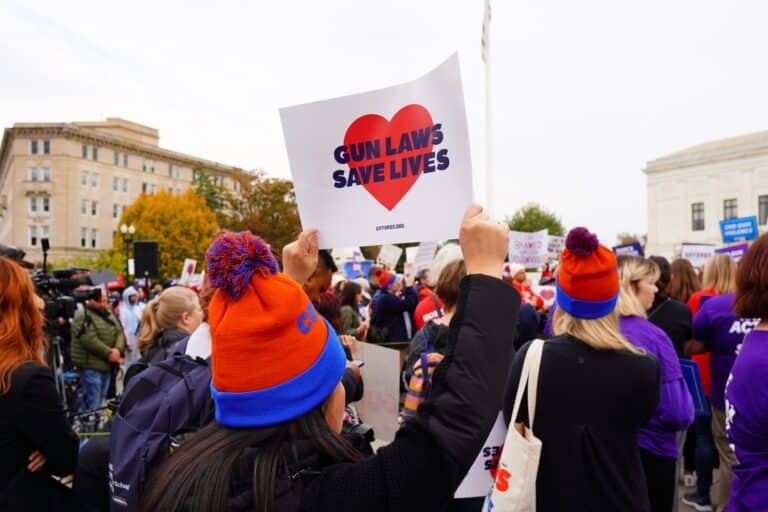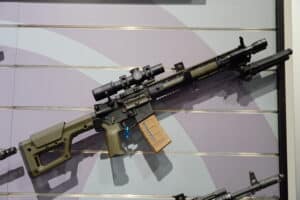A particularly flimsy legal theory has reappeared in federal Second Amendment litigation.
On Monday, US District Judge John L. Kane upheld Colorado’s three-day waiting period for gun purchases. He ruled the sales restriction didn’t violate the Second Amendment. His reasoning? The Second Amendment doesn’t actually protect gun sales at all.
“After examining the language of the Second Amendment using the Supreme Court’s analysis in Heller, I find, for the purposes of Plaintiffs’ Motion, that the plain text does not cover the waiting period required by the Act,” he wrote in Rocky Mountain Gun Owners v. Polis. “This conclusion is bolstered by the fact that the Act is a regulation on the commercial sale of firearms and thus is presumptively permissible.”
Judge Kane, a Jimmy Carter appointee, said the state’s restriction passes the Second Amendment test established in the Supreme Court’s New York State Rifle and Pistol Association v. Bruen decision by effectively short-circuiting it. Instead of examining the historical record for analogs to the modern waiting period, he argued that was unnecessary because the “right to keep and bear arms” doesn’t directly mention a right to buy, make, or sell them.
“From this reading of the plain text, it is clear the relevant conduct impacted by the waiting period—the receipt of a paid-for firearm without delay—is not covered,” he wrote. “Still, Plaintiffs attempt to equate the words ‘obtain’ and ‘possess.’ But these terms are not equivalent. To ‘keep,’ under the definitions provided in Heller, meant to retain an object one already possessed. It did not mean to receive a newly paid-for item, and it certainly did not mean to receive that item without delay. Likewise, ‘hav[ing] weapons’ indicates the weapons are already in one’s possession, not that one is receiving them.”
As I said when a judge in the Ninth Circuit employed the same logic to uphold a homemade gun ban last year, this is like a “one weird trick that plaintiffs hate” theory of Bruen. There’s no need to perform the analysis the Supreme Court requires if you cut the case off before it even really begins.
“Though it leads with a recognition of the primacy of Bruen’s ‘plain text’ point, [the plaintiff] seeks in its opening brief to jump ahead in the analysis to a historical/tradition assessment (and to jump ahead in Bruen to that decision’s discussion of how to conduct such an assessment),” Judge George H. Wu wrote in his ruling rejecting a request for a preliminary injunction against California’s ban on unserialized homemade guns. “But it has effectively attempted to avoid the necessary threshold consideration – does the ‘Second Amendment’s plain text’ cover the issue here? No, it plainly does not. AB 1621 has nothing to do with ‘keep[ing]’ or ‘bear[ing]’ arms.”
There has been a lot of disagreement among the lower court as to how best to implement the Bruen test. Judges have come down on different sides of whether the same restrictions have relevantly similar historical analogues. That disagreement will likely continue until the Supreme Court steps in and further clarifies how lower courts should carry out its test–a process it’s expected to start in its current case United States v. Rahimi.
But the idea that the Second Amendment guarantees the right to keep and bear arms but not the right to make or acquire arms isn’t likely to be part of that clarification. It’s simply too cute by half. The argument makes you wonder what exactly Judge Kane and Wu think the point of protecting keeping and bearing arms is if the government can simply ban their manufacture or sale.
Judge Kane seemed to realize this because he did go through an attempt to do the actual Bruen analysis. He ruled that the law would still stand even if the Second Amendment protects sales. He argued colonial-era laws that disarmed intoxicated people were relevantly similar to the waiting period because both aimed at “preventing impulsive acts of firearm violence.”
“These measures are sufficient to show that our Nation had a historical tradition of regulating the carrying and use of firearms by intoxicated individuals,” Judge Kane wrote. “Plaintiffs do not seem to dispute this determination, but instead focus on whether those regulations are ‘relevantly similar’ to the Waiting-Period Act. For the purposes of this proceeding, I hold that they are.”
That line of argument doesn’t seem much more likely to persuade the Supreme Court–if it ever makes it that far up the ladder. But it at least engages with the test the Court handed down. The idea that the Second Amendment provides no protection at all to the act of acquiring arms is little more than an attempt to hand wave away Bruen.






